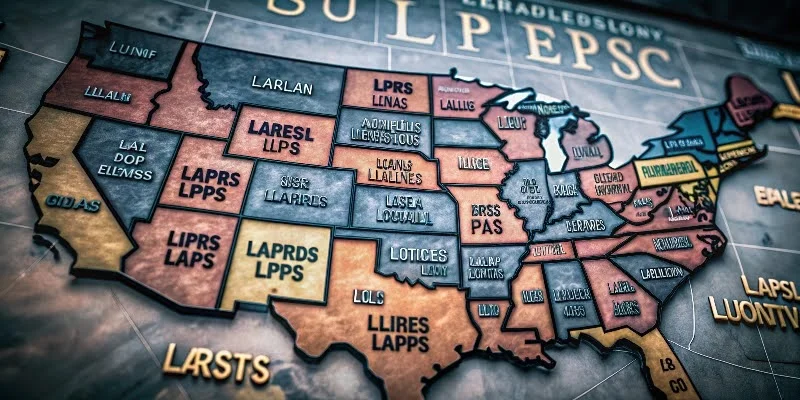Limited Liability Partnerships (LLPs) are a popular business structure offering partners limited personal liability for business debts and liabilities while enabling flexible management and tax benefits. However, the availability, regulations, and advantages of LLPs differ widely by state.
Understanding these state-specific laws and requirements is crucial before deciding where to form your LLP.
In this comprehensive article, we will cover:
- What exactly is an LLP?
- How LLP laws vary across U.S. states
- Detailed overview of which states allow LLPs and under what conditions
- Key differences in LLP liability protections and filing requirements by state
- Step-by-step process to form an LLP in different states
- Pros and cons of forming an LLP in various states
- Important factors to consider when choosing a state for your LLP
- 10 detailed FAQs about LLPs and state regulations
What Is a Limited Liability Partnership (LLP)?
A Limited Liability Partnership (LLP) is a hybrid business entity that combines features of both partnerships and corporations. Like a partnership, LLPs allow multiple partners to share management responsibilities and enjoy pass-through taxation—meaning profits and losses pass through directly to the partners without corporate-level taxes.
Unlike general partnerships, LLPs provide limited liability protection. This means partners are typically not personally liable for business debts or for negligence, malpractice, or misconduct committed by other partners. This protection makes LLPs attractive to professional groups such as lawyers, accountants, architects, and doctors.
LLPs offer the flexibility of partnership management without exposing individual partners to unlimited personal risk. However, the exact legal treatment and rules governing LLPs are set by each state, which leads to variations in how LLPs operate depending on where they are formed.
LLP Laws Across the United States
Unlike corporations or LLCs, LLPs are governed entirely at the state level, and there is no single federal LLP statute. While many states have adopted uniform partnership laws inspired by the Revised Uniform Partnership Act (RUPA), each state’s LLP laws can differ significantly.
Some states allow LLPs only for licensed professionals, such as attorneys or accountants, and forbid non-professional business LLPs. Other states allow LLPs for any business purpose, including startups and general business ventures.
Further differences include:
- Liability protection scope — Some states shield partners fully from liabilities arising from other partners, while others only offer limited protections.
- Filing and annual reporting requirements — These vary widely, affecting administrative costs.
- Name requirements — Some states require LLPs to include “LLP” or “Limited Liability Partnership” in the business name.
- Tax treatment — Most states treat LLPs as pass-through entities for tax purposes, but some states impose franchise or excise taxes.
Which States Allow LLPs?
As of 2025, all 50 states plus the District of Columbia allow the formation of LLPs in some form. However, the permitted uses, formation rules, and liability protections can vary. Let’s explore how some major states approach LLPs:
California
California restricts LLP formation primarily to licensed professionals such as attorneys, accountants, and architects. Non-professional businesses cannot form LLPs in California. LLPs must register with the California Secretary of State, pay an $70 filing fee, and file biennial reports with a $20 fee. California LLPs also pay an annual $800 minimum franchise tax.
New York
New York permits LLP formation mainly for licensed professionals. To form an LLP, you must file a Statement of Qualification with the New York Department of State and publish a notice of formation in local newspapers. The filing fee is $200. New York LLPs must file biennial reports as well.
Texas
Texas allows both professional and non-professional LLPs, making it attractive for a wide range of businesses. The filing fee is $300. Texas LLPs must file annual reports with the Secretary of State. Texas provides strong liability protections and no franchise tax for LLPs.
Florida
Florida allows LLPs for professional service providers. The filing fee is $500, and LLPs must file annual reports with a $138.75 fee. Florida LLPs enjoy protection from liability for malpractice committed by other partners.
Illinois
Illinois allows LLP formation with a $250 filing fee. Illinois LLPs must file annual reports with a $75 fee. Liability protections cover negligence or misconduct of other partners.
State-by-State Variations in LLP Regulations
Professional vs. Non-Professional LLPs
- Professional LLPs only: States like California, New York, and Massachusetts restrict LLP formation to licensed professionals only. If your business is non-professional, you cannot form an LLP in these states.
- General LLPs allowed: States such as Texas, Florida, Illinois, and Delaware allow LLPs for any lawful business purpose, not just professionals.
Liability Protection
- Most states protect LLP partners from personal liability arising from other partners’ negligence or misconduct.
- Some states extend liability protection further to cover business debts and obligations, while others do not.
- Certain states may impose exceptions or limitations for specific types of liability (e.g., tax debts or environmental liabilities).
Filing Fees and Reports
- Initial filing fees range from about $50 in some states (e.g., Arkansas) to over $500 (e.g., Florida).
- Annual or biennial reports are commonly required to keep the LLP in good standing. These often carry fees between $20 and $150.
- Some states have no ongoing reporting fees but may impose franchise or excise taxes.
Naming Requirements
- Most states require LLPs to include “LLP” or “Limited Liability Partnership” in their registered business name to clearly indicate liability status.
- Some states have additional rules restricting certain words or requiring unique names.
How to Form an LLP in Different States
Though state procedures vary, here are the common steps to forming an LLP:
- Choose a Business Name
Make sure the name is unique and complies with state naming laws. Typically, it must include “LLP” or similar designation. - Check Professional Licensing Requirements
If your state restricts LLPs to professionals, verify all partners hold the necessary licenses. - File Certificate of Limited Liability Partnership
Submit the required formation documents with the state’s Secretary of State or equivalent office. Pay the required filing fee. - Draft an LLP Agreement
Although not always required, this internal document governs partner duties, profit sharing, management, and liability. - Register for State Taxes and Licenses
Obtain any necessary business permits or licenses and register for state tax accounts. - File Annual/Biennial Reports
Maintain compliance by submitting required periodic reports and fees. - Foreign Qualification
If operating in multiple states, register your LLP as a foreign LLP in other states where you conduct business.
Advantages of Forming an LLP in Different States
- Liability Protection — Shielding partners from other partners’ misconduct protects personal assets.
- Pass-Through Taxation — Avoids double taxation seen in corporations.
- Flexible Management — Partners can actively manage without jeopardizing liability protection.
- Professional Credibility — LLPs are well-regarded structures for professional service firms.
- Lower Compliance Costs — Some states offer lower fees and lighter reporting burdens.
Disadvantages of LLPs by State
- Limited to Professionals in Some States — Restricts business options.
- Varying Liability Protections — Some states provide weaker shields.
- Compliance Burden and Fees — High fees and strict reporting can increase costs.
- Complex Foreign Registration — Doing business in multiple states adds complexity.
- Limited Recognition Outside the Forming State — Can complicate expansion.
Choosing the Right State for Your LLP
Consider these factors:
- Business Type: Are you a licensed professional? Some states restrict LLPs to professionals only.
- Cost: Filing fees, annual reports, and franchise taxes vary widely.
- Liability Laws: Some states offer stronger personal asset protections.
- Taxation: Some states tax LLPs differently.
- Compliance Complexity: States with minimal paperwork reduce hassle.
- Location of Operations: Usually, you form your LLP where you do business or live.
Final Thoughts
All states in the U.S. recognize LLPs, but the specifics differ. Your choice of state affects your LLP’s formation process, liability protection, tax treatment, and costs. By carefully reviewing your business type, budget, and long-term goals, you can select the state that best supports your LLP’s success.
FAQS
1. Can I form an LLP in every U.S. state?
Yes, all 50 U.S. states and Washington D.C. allow the formation of Limited Liability Partnerships (LLPs), although the requirements and limitations vary depending on the state.
Some states, like California and New York, only allow certain licensed professionals—such as lawyers, accountants, or doctors to form an LLP.
Other states are more flexible and permit a broader range of businesses to register as LLPs.
The specific rules, paperwork, and fees are determined by the Secretary of State in each jurisdiction.
Before forming an LLP, it’s crucial to understand whether your type of business qualifies in your chosen state. Make sure to review the guidelines on your Secretary of State’s official website before moving forward.
2. Which states only allow professionals to form LLPs?
Several states restrict the formation of LLPs to licensed professionals, meaning only individuals with state-approved certifications can register one.
California is a prime example, where only licensed professionals such as attorneys, architects, or public accountants can operate under an LLP structure.
New York, Oregon, and Nevada also have similar limitations requiring certain professions to be licensed to form an LLP.
These restrictions are often put in place to protect clients and ensure liability is appropriately managed.
If your business does not fall under a professional category, you may need to explore forming an LLC or another entity type.
Always double-check the eligibility requirements for LLPs within your state before filing any documents.
3. Can general business owners form LLPs in any state?
In many states, yes, general business owners who are not licensed professionals can form an LLP, especially in business-friendly states like Texas, Florida, and Delaware.
These states allow broader access to LLP status for partnerships in various industries beyond just law or medicine.
However, in states with strict regulations, you may find that only professionals are permitted to register LLPs.
Always consult your Secretary of State’s website or a legal advisor to ensure your business qualifies.
If your business doesn’t meet the criteria, forming an LLC or a general partnership might be more suitable.
Understanding your state’s rules can save you time, money, and legal complications later.
4. How do I register an LLP in my state?
To register an LLP, you typically need to file a Certificate of Limited Liability Partnership with your state’s Secretary of State or equivalent business authority.
This form requires you to provide your business name, the physical address, and the names of all general partners involved.
Some states also require a registered agent, who will accept legal documents on behalf of the LLP.
Depending on your state, you may be asked to submit proof of professional licensing if applicable.
Filing fees vary widely, from as low as $50 to over $300, so it’s essential to budget accordingly.
After registration, you may also need to file additional documents like annual reports or publication notices.
5. Are there annual requirements to maintain an LLP?
Yes, most states require LLPs to comply with annual or biennial maintenance filings to remain in good standing.
These filings often include an annual report that updates the state on your business’s structure and address.
States may also charge annual renewal or franchise taxes depending on revenue or net worth.
Failing to meet these obligations can result in fines, penalties, or administrative dissolution of the LLP.
Some states offer grace periods, but it’s always best to submit documents before the deadline.
Maintaining compliance helps protect your liability shield and business credibility.
6. Which states are considered most LLP-friendly for businesses?
States like Texas, Delaware, and Florida are often viewed as the most LLP-friendly due to their flexible regulations, low fees, and robust liability protections.
Delaware is especially popular for legal entities because of its business-friendly court system and predictable legal environment.
Texas offers wide accessibility for LLP formation and doesn’t restrict LLPs to licensed professionals.
Florida combines simplicity in paperwork with low filing fees, making it attractive to startups and small businesses.
These states also offer streamlined online systems for filing and managing compliance.
Choosing a favorable state can reduce red tape and save operational costs for your LLP.
7. Do LLPs offer the same legal protection in all states?
No, the level of liability protection provided by an LLP can vary from state to state, especially regarding protection from the actions of other partners.
Some states offer full liability protection against the debts and negligent acts of your partners, while others may offer only partial protection.
For example, California’s LLP laws may limit the liability protection if the partnership fails to meet certain insurance requirements.
This inconsistency makes it crucial to read your state’s LLP statutes before forming one.
Consulting a business attorney or legal expert in your state is often recommended for clarity.
Making the wrong assumption about liability can expose you to personal risk.
8. Can LLPs operate in multiple states?
Yes, an LLP can operate across state lines, but it must register as a foreign LLP in each additional state where it does business.
This involves filing paperwork such as a Certificate of Authority and paying any applicable foreign registration fees.
You may also be required to appoint a registered agent in each new state.
Keep in mind that each state has its own legal definitions of what qualifies as “doing business.”
Failure to register as a foreign LLP where required can lead to fines and legal restrictions.
Make sure your LLP stays compliant in every jurisdiction where you have clients or conduct operations.
9. Are there federal laws that govern LLPs?
No, LLPs are formed and governed at the state level, and there is no overarching federal law specifically for LLPs. However, LLPs must still comply with federal tax laws and regulations from the IRS.
Federal laws also apply if the LLP deals in regulated industries like healthcare, finance, or defense.
LLPs will need an Employer Identification Number (EIN) from the IRS to handle payroll and taxes.
All partners in the LLP must also report income or losses on their personal tax returns.
While formation is state-regulated, federal tax rules still play a major role in operations.
10. What alternatives are available if my state doesn’t allow general LLPs?
If your state limits LLPs to licensed professionals and you don’t qualify, you have several alternatives.
One common option is forming a Limited Liability Company (LLC), which offers similar liability protection and flexible management. Another route could be a general partnership or corporation, depending on your business goals and tax preferences.
LLCs are often easier to manage and allow single or multiple owners without professional licensing.
You could also consider incorporating in a state with more favorable LLP laws and registering as a foreign LLP in your home state.
Before choosing, speak with a legal advisor to find the best fit for your business model.



